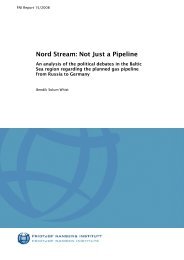SAIIA SOUTH AFRICAN DIPLOMATS ABROAD.pdf
SAIIA SOUTH AFRICAN DIPLOMATS ABROAD.pdf
SAIIA SOUTH AFRICAN DIPLOMATS ABROAD.pdf
Create successful ePaper yourself
Turn your PDF publications into a flip-book with our unique Google optimized e-Paper software.
After the war South Africa had, for some time, u new<br />
diplomatic relation with Italy. The Union had a "diplomatic<br />
representative" in Rome while the Italians had a Government<br />
Representative" in Pretoria. Once peace was signed Ministers<br />
were exchanged in the normal fashion. As a matter of convenience<br />
small powers like^Luxembourg are represented by the consulates<br />
of larger states. ^(Kelgium in this instance and Switzerland in<br />
the case of Liechtenstein.)<br />
Of fundamental importance in the operation of the foreign<br />
relations of South Africa, or any other state, is the preservation<br />
of the inviolability of legations. A Chinese consular official,<br />
himself not enjoying diplomatic immunity had been arrested<br />
by mistake, and this emphasised the awkward situations that<br />
could arise. The Diplomatic Immunities Act was passed in 1932,<br />
making it a serious criminal offence Tor any person to take legal<br />
action against any member of a diplomatic staff. To-day it is<br />
customary to forward to the Department of External Affairs<br />
lists of personneLorririe basis of" which it publishes in the "Union<br />
Government Gazette" the names of protected individuals,<br />
including wives, children and hojusehpld staff. No policemen or<br />
office of the court is allowed access to diplomatic property in his<br />
official capacity.<br />
When a new Minister Plenipotentiary arrives in the Union<br />
the Department of External Affairs arranges for him to present<br />
his "letters of credence" to the Governor-General as head of the<br />
State^Ai'ter the dooiment has been handed over, the Minister<br />
and the Governor-General {who-is attended by the Union<br />
Minister ot foreign Atairs) make short ceremonial speeches<br />
expressing pleasure at the meeting and goodwill towards each<br />
other's nations.<br />
Consuls ^undergo no such ritual but act under a Commission<br />
from their own Government while Exequatur,- i.eT^autKority<br />
from the receiving Government, mustgenefally be confirmed<br />
by the King on the advice of his South African/Ministers. 1 It has<br />
sometimes happened that a nominee has proved unwelcome for<br />
political or other reasons, in which case he is called "persona non<br />
grgtaj' but no such case has been recorded in the Omont For<br />
a consul appointed to the Union the Exequatur is signed at the<br />
top by the King (who always signs at the head of a document)<br />
and after saying who the representative is and by whom appointed,<br />
goes on:<br />
"We have approved of this appointment according to<br />
the Commission beforementioned, Our Will and Pleasure are,<br />
and We hereby require that you do receive. ... in the exercise<br />
1 Where the Commission is issued by the Head of a Foreign State the Union<br />
Government will approach the King with a request to issue his Exequatur.<br />
Where it is issued by a Minister of Foreign Affairs the Union Governor-<br />
General grants recognition.<br />
(2S)













